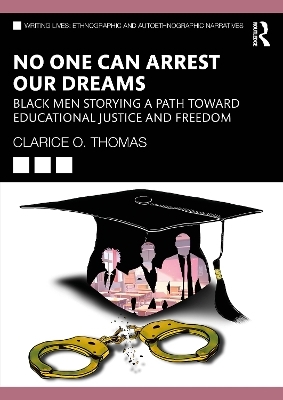
No One Can Arrest Our Dreams
Routledge (Verlag)
978-1-032-63491-3 (ISBN)
This book critically analyzes the school policies and individual practices that inflict educational harm upon the lives of students who experience criminalization, disengagement, and lack connectedness and a sense of belonging at school. The narratives center the voices of three men who describe how home environments and educational policies and practices structure schools into locations where Black and other minoritized students are forced to survive. Their stories help examine how criminalized experiences—school removal and incarceration—intersect with historical and social factors that create anti-Black practices in schools and communities. These narrative accounts are critical pedagogical tools for those who work with Black, Latinx, low-income, and other minoritized youth. Readers will have a more in-depth understanding about how Black males experience schools, neighborhoods, and the world.
This volume will appeal to teachers and teacher educators in K-12 schools, colleges, and universities. More specifically, faculty in programs that lead to elementary, middle, and secondary education certifications can incorporate the stories into courses around cultural diversity, equity and inclusion, social justice, and humanizing pedagogies. Community organizations can use the narrative accounts to create spaces for transformative conversations that aim to improve school and community policing practices.
Clarice O. Thomas, PhD, is an assistant professor in the Department of African American Studies & School of Education at Saint Louis University. She is the director of the Teaching Well Institute for School Transformation (TWIST) and teaches courses in the Prison Education Program. Dr. Thomas’s research has focused on storytelling for social justice in teacher education and improving racial justice in mass incarceration issues. She is the recipient of a PEN America Writing for Justice Fellowship to advance her work that examines the impact of multigenerational incarceration on Black families and communities in the United States.
An Important Author’s Note Introduction: Storying Dreams in Black Education 1. Living and Learning in the Carceral Matrix Storied Reflection: Remembering Relationships with/in Spaces 2. Navigating the Fork in the Road Storied Reflection: Teaching in Real Time 3. Survival Mode Storied Reflection: Trouble Around the Corner 4. Restoring Broken Dreams Conclusion: Storytelling for Educational Justice Something to Tell My Mom: An Autoethnography of Teaching in the Prison Education Program A Note on Narrative Inquiry
| Erscheinungsdatum | 15.02.2024 |
|---|---|
| Reihe/Serie | Writing Lives: Ethnographic Narratives |
| Verlagsort | London |
| Sprache | englisch |
| Maße | 174 x 246 mm |
| Gewicht | 267 g |
| Themenwelt | Sozialwissenschaften ► Ethnologie |
| Sozialwissenschaften ► Pädagogik | |
| Sozialwissenschaften ► Soziologie ► Gender Studies | |
| ISBN-10 | 1-032-63491-X / 103263491X |
| ISBN-13 | 978-1-032-63491-3 / 9781032634913 |
| Zustand | Neuware |
| Haben Sie eine Frage zum Produkt? |
aus dem Bereich


